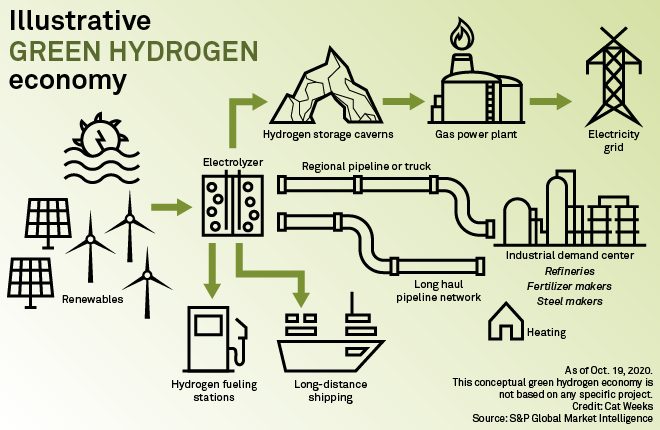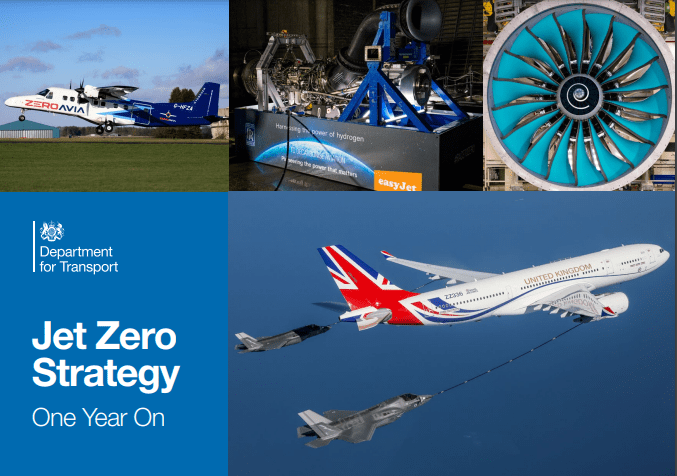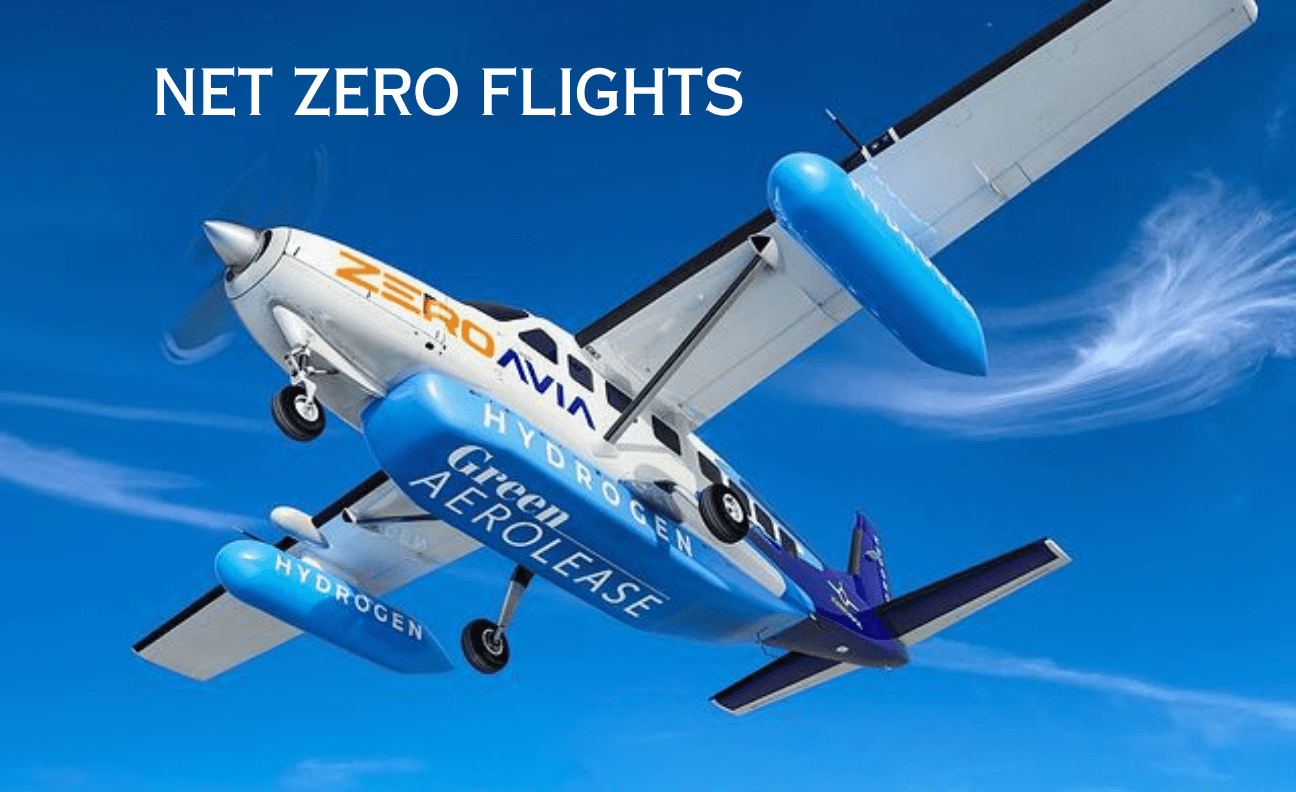ZeroAvia, a pioneering aviation company committed to sustainable air travel, is making remarkable strides by developing electric engines that produce zero carbon emissions.
With a target to revolutionise commercial flights by 2025, ZeroAvia has already achieved significant milestones, including nine successful test flights utilising their cutting-edge hydrogen-electric engine at Cotswold Airport, near Cirencester.
Carbon-Free Flying: ZeroAvia’s Vision for Decarbonising Aviation
ZeroAvia’s dedication to decarbonising aviation is driven by their vision of a future where carbon emissions are eliminated from commercial flights.
Their hydrogen-electric engine represents a groundbreaking step towards achieving this goal, with the engine emitting only water vapour, making it an eco-friendly alternative to traditional engines.
Furthermore, Sergey Kiselev, Vice-President of ZeroAvia, expressed his confidence that their engine will play a vital role in the decarbonisation of the aviation industry.
A milestone moment in #zeroemission technology flight testing!
— ZeroAvia (@ZeroAvia) July 19, 2023
We have now completed the 10th successful flight of the #Do228 testbed #aircraft, marking the completion of our initial flight test campaign using the prototype ZA600.
Read here: https://t.co/qWwpRnX8fk
ZeroAvia’s Accelerated Timeline: Designing Efficiency with Existing Aircraft
While many aerospace firms are developing engines that run on hydrogen, most do not anticipate flying commercially until 2035. However, ZeroAvia, based in Gloucestershire, is advancing at an accelerated pace by opting to retrofit existing aircraft rather than designing entirely new ones.
Their current focus is on the Dornier 228, a conventional 19-seater plane equipped with two propellers traditionally powered by kerosene. However, ZeroAvia had the idea to replace one propeller with an electric engine, generating electricity on-board using a hydrogen fuel cell.
During the testing phase, the second engine remains fueled by kerosene as a backup precaution, but once the technology is proven, both engines will solely run on electricity derived from the hydrogen fuel cell.
Notably, certification procedures are currently underway through collaboration with the Civil Aviation Authority.
Pilot’s Perspective: The Promise of Hydrogen-Electric Systems
Test pilot, Jon Killerby, who flew the aircraft during the trials, highlighted the hydrogen-electric system’s impressive capabilities. He confirmed that once airborne, the aircraft successfully operated without the kerosene engine, relying solely on the hydrogen-electric system.
In fact, the system generated enough thrust to maintain level flight while the conventional engine was throttled back.
This groundbreaking innovation demonstrates the potential of hydrogen fuel cells, which have already been widely adopted in the automotive industry, to power aviation without contributing to greenhouse gas emissions.
Green Hydrogen: The Key to Sustainable Air Travel
Understanding the importance of hydrogen sourcing, Professor Tim Mays, from Bath University, has spent three decades studying the potential of hydrogen as a sustainable energy source.
Furthermore, Professor Mays heads the UK Hydrogen Research Hub, which was recently awarded £11m to explore how hydrogen can combat climate change effectively. Prof. Mays explained that while hydrogen production from natural gas and steam is unsustainable, electrolysis provides a viable solution.
By using renewable electricity to split water into hydrogen and oxygen, green hydrogen can be produced. What’s more, this eco-friendly hydrogen is precisely what the aviation industry needs to replace kerosene, marking a significant step towards sustainable air travel.

Scaling up: The Potential of ZeroAvia’s Hydrogen-Electric Engine
Although the Dornier 228, with the current hydrogen engine, accommodates approximately 12 passengers and can fly distances of 250-310 miles (400-500km), ZeroAvia’s long-term plans involve scaling up their technology.
By 2027, they aim to develop a larger hydrogen-electric engine capable of powering an aircraft that can carry around 50 passengers and cover distances nearing 620 miles (1,000 km).
What’s even more impressive is that this expansion would open up the possibility of more extensive applications for hydrogen-electric engines, taking sustainable air travel to new heights.

Overcoming Challenges: Establishing a Hydrogen Infrastructure
While hydrogen technology holds immense potential for decarbonising aviation, there are significant challenges to overcome. The aviation industry must invest in building a comprehensive hydrogen infrastructure, including production centres, transportation networks, and storage facilities.
What’s more, the uniqueness of hydrogen compared to conventional fuels adds a lot more complexity to the equation, however, despite the challenges, ZeroAvia has already secured orders for over 1,500 of its initial engines.
Early customers, such as Air Cahana, a Californian airline focused on decarbonisation, and environmental entrepreneur Dale Vince‘s “Ecojet,” reflect the growing interest in ZeroAvia’s engines and their potential to transform the industry.
A Watchful Eye: Industry Interest and Airbus’ ZeroE Program
ZeroAvia’s progress has garnered attention from prominent aerospace companies. One such company is Airbus, who through its ZeroE research program, is actively exploring hydrogen as a viable alternative for aviation.
Interestingly, their research includes investigating both hydrogen fuel cells for electricity generation and the direct combustion of liquid hydrogen. While Airbus aims to introduce hydrogen-powered planes by 2035, ZeroAvia’s smaller engines are expected to achieve commercial viability a decade earlier.
Though, it should be noted that Sergey Kiselev attributes this accelerated timeline to ZeroAvia’s decision to retrofit existing aircraft, streamlining the certification process and allowing the focus to be primarily on engine development.
Conclusion
ZeroAvia’s ambitious commitment to introducing carbon-free electric engines for commercial flights by 2025 represents a significant leap forward in sustainable air travel. Through successful test flights and their unique approach of retrofitting existing aircraft, ZeroAvia is well on its way to achieving its goal.
While challenges such as establishing a reliable hydrogen supply infrastructure remain, ZeroAvia’s relentless pursuit of innovation still sets a remarkable precedent for the industry.
What’s more, by embracing renewable energy sources and reducing carbon emissions, ZeroAvia is spearheading a transformative era of greener air travel for all.









